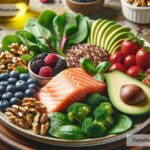The Benefits of a Balanced Diet for Weight Loss: Sustainable Strategies
When it comes to weight loss, there’s often a temptation to follow trendy diets that promise quick results. Whether it’s cutting out entire food groups, surviving on juice cleanses, or hopping on a keto craze, many of these approaches might yield initial progress but often fail in the long term. Why? Because they’re not sustainable.
Instead of chasing trends, the key to effective and lasting weight loss lies in a balanced diet. Eating a variety of healthy foods, in the right proportions, can help you reach your weight loss goals while keeping your body nourished and energized. Let’s dive into why a balanced diet is the best strategy and how it promotes sustainable weight loss.
What Is a Balanced Diet?
A balanced diet includes a mix of essential nutrients your body needs to function properly. This means eating a combination of:
- Carbohydrates (like whole grains, fruits, and vegetables): These provide energy for your daily activities.
- Proteins (such as lean meats, beans, tofu, and nuts): They help repair and build tissues and muscles.
- Healthy Fats (found in avocados, olive oil, nuts, and seeds): These support brain health and hormone production.
- Vitamins and minerals (from fruits, veggies, and dairy): These boost immunity and overall health.
The idea is not to exclude any food group completely but to eat everything in moderation while making healthier choices. For example, choose whole grains over refined flour, and grilled chicken over fried chicken.
How a Balanced Diet Supports Weight Loss
Unlike crash diets, which often restrict calories to extreme levels or cut out entire food groups, a balanced diet provides steady, sustainable weight loss. Here’s why it works:
1. Keeps You Full and Satisfied
Foods high in fiber (like vegetables, fruits, and whole grains) and protein (like eggs, fish, and beans) keep you full for longer periods of time. When you’re satisfied, you’re far less likely to snack on unhealthy foods or binge eat later. For example, a breakfast of scrambled eggs with spinach and whole-grain toast will keep you full much longer than a bowl of sugary cereal.
2. Prevents Nutritional Deficiencies
Extreme or restrictive dieting often leads to nutrient deficiencies. Not eating enough of certain vitamins and minerals can leave you feeling tired, moody, and weak. A balanced diet ensures your body gets everything it needs to function well. When you feel good and have energy, you’re more motivated to stick to your goals and maintain an active lifestyle.
3. Encourages Healthy Habits
Adopting a balanced diet means learning how to plan meals, portion sizes, and food combinations that work for you. These habits help build a healthy relationship with food and make weight loss sustainable. Over time, you stop thinking of dieting as something temporary and instead see healthy eating as a way of life.
4. Stabilizes Your Blood Sugar
Balanced eating helps regulate blood sugar levels, reducing cravings for sugary and processed foods. For example, combining a complex carbohydrate (like sweet potatoes) with protein (like grilled chicken) slows down the digestion process, keeping energy levels stable and avoiding sugar spikes that lead to overeating.
5. Supports Metabolism
When your diet contains adequate calories and nutrients, your body’s metabolism remains active, allowing you to burn calories efficiently. On the other hand, skipping meals or starving yourself slows your metabolism, making it harder to lose weight.
Sustainable Strategies for a Balanced Diet
Now that we know why a balanced diet works for weight loss, here are some simple strategies to make it sustainable:
a) Plan Ahead
Meal prepping helps you avoid impulsive food choices. Spend time planning your meals and snacks for the week, and include a mix of lean protein, whole grains, fruits, and vegetables.
b) Portion Control
Even healthy foods can lead to weight gain if eaten in excess. Use smaller plates, measure servings, and be mindful of portion sizes to avoid overeating.
c) Eat Mindfully
Pay attention to what you’re eating and savor each bite. Avoid distractions like your phone or TV while eating, and stop when you’re satisfied—not stuffed.
d) Include Healthy Snacks
When hunger strikes between meals, opt for nourishing snacks like nuts, yogurt, or fruit. Healthy snacking prevents overeating during main meals.
e) Treat Yourself Sometimes
No food is ‘bad,’ and you don’t have to completely eliminate treats like chocolate or pizza. Enjoy them occasionally and balance them with healthier meals.
f) Stay Hydrated
Drinking plenty of water supports digestion and prevents overeating (sometimes thirst is mistaken for hunger). Choose water over sugary drinks whenever possible.
Remember, It’s a Lifestyle, Not a Diet
The beauty of a balanced diet is that it isn’t restrictive or temporary. It’s a flexible, sustainable lifestyle that you can adapt to suit your preferences and needs. The goal isn’t to deprive yourself—it’s to nourish your body while working toward your weight loss goals.
By focusing on balance, moderation, and variety, you can lose weight at a steady pace and keep it off for good. More importantly, you’ll feel healthier, happier, and full of energy along the way. Forget fad diets—a balanced diet is the true key to sustainable weight loss success!


